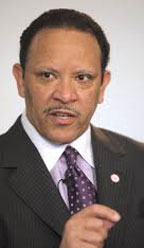The lessons of Ferguson, Part I: Economic inequality
By Marc H. Morial NNPA Columnist
“The ultimate measure of a man is not where he stands in moments of comfort and convenience, but where he stands at times of challenge and controversy.” Dr. Martin Luther King, Jr.
I am haunted by the words spoken by Lesley McSpadden immediately following the shooting death of her son, Michael Brown, at the hands of Ferguson, Mo. Police Officer Darren Wilson almost a month ago. She said, “Do you know how hard it was for me to get him to stay in school and graduate? You know how many Black men graduate? Not many. Because you bring them down to this type of level, where they feel like they don’t got nothing to live for anyway.”
Let’s begin with the lack of jobs and the epidemic of unemployment in Ferguson, a city that is 67 percent Black. The National Urban League’s 2014 “State of Black America Report” found that the St. Louis metro area, which includes Ferguson, had a Black unemployment rate of 19.6 percent and a white unemployment rate of 6.9 percent – resulting in unemployment Equality Index of 35.2 percent on a 100-point scale.
This level of economic inequality reflects a glaring disparity of opportunity and has created a chasm of misunderstanding and distrust that is be-hind much of the violence that has erupted between police and citizens.
Four years out of the recession, America’s private sector is expanding, but too many people have been left behind. In fact, many communities like Ferguson are worse off. According to a recent Brookings study, “Between 2000 and 2010-2012, Ferguson’s poor population doubled.”
The National Urban League has long been leading the charge for targeted federal and state action to bring jobs and opportunity to hard-pressed communities across the nation. Our “Jobs Rebuild America” campaign is a $100 million, five-year effort to engage federal government, business, and nonprofit resources to create economic opportunity in 50 communities across the country through the Urban League affiliate network with a special emphasis on vulnerable youth.
In response to the crisis in Ferguson, Vermont Senator Bernie Sanders sent a letter to his Senate colleagues calling for both a thorough federal investigation of the shooting death of Michael Brown and targeted legislation to bring jobs to Ferguson and similar struggling cities. Sanders points out, “There is an economic crisis facing our nation’s youth, particularly young African-Americans. Nationwide, the youth unemployment rate today is more than 20 percent and African-American youth unemployment is nearly 35 percent. The legislation would provide $5.5 billion in immediate funding to states and localities to employ 1 million young Americans between the ages of 16 and 24.”
At Michael Brown’s funeral service, Rev. Al Sharpton called on the nation and our community to task: “We can’t have a fit; we’ve got to have a movement. We’ve got to be here for the long haul and turn our chants into change, our demonstration into legislation.”
One of the big lessons of Ferguson is the importance of investing in jobs, education and other tools to combat poverty in our communities instead of militaristic weapons for use against our communities. We hope that Washington and America are listening – and preparing to act.

